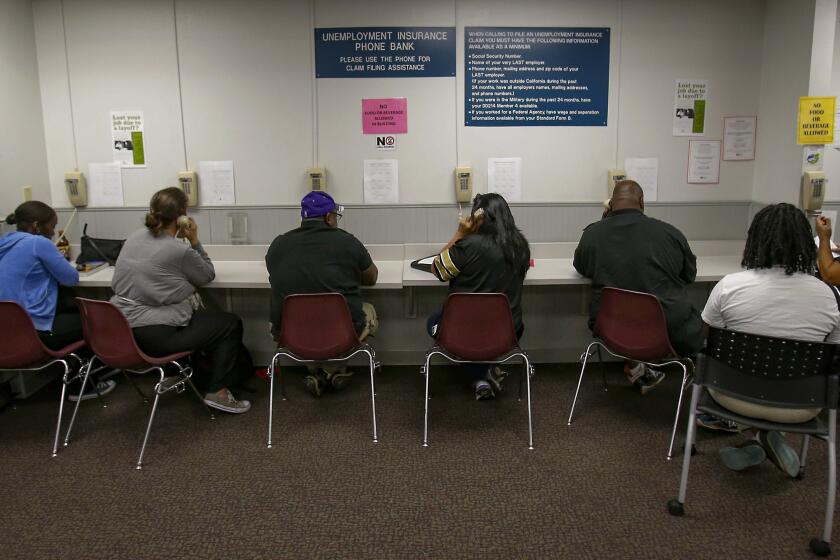Basic Four Applying Iacocca Formula to Its Future
When Lee Iacocca took over the helm of the failing Chrysler Corp., he quickly laid off thousands, shut down plants, sold off operations and dubbed the object of his regime the “New” Chrysler Corp.
And so it goes at MAI Basic Four Inc., the computer maker in Tustin. When New York investor Bennett LeBow bought the once proud and profitable company in January for $105 million, he removed all but four of its 23 top executives, laid off about 10% of its worldwide work force, sold its Canadian operations--and shamelessly borrowed a marketing touch from Iacocca.
“It’s the ‘NEW!’ MAI Basic Four,” the 15-year-old firm’s slick brochures proclaim. “The quarter-billion-dollar start-up company.”
Indeed, MAI Basic Four is getting a rare second chance in an industry known for its ruthless treatment of the faltering and the lame.
The company, among the pioneer manufacturers of intermediate-sized computers for mid-sized businesses, cemented its place in high-tech history with its easy-to-use machinery and the simplified software language called BASIC. But along the way Basic Four lost ground to more aggressive competitors and saw its market seriously eroded by the small but powerful personal business computers.
By late 1984 the company was on the block as part of the liquidation of its parent, New York-based Management Assistance Inc. Despite sales of more than $260 million, it had suffered two consecutive years of red ink, including nearly a $10-million loss in 1984. Furthermore, the mid-sized computer industry was suffering a nationwide downturn.
Despite all the negative news, including the laying off of 300 workers last month, the folks at the NEW! MAI Basic Four argue that the glass is really half full.
“The company is healthier now than ever before,” LeBow claimed this week in his first interview since buying the company. “We’re done with the layoffs. We did them quickly and now we’re getting on with business.”
The game plan, which LeBow is drafting with acting chief executive William Weksel, calls for the company to position itself as a major supplier of computers to specific business groups, such as the textile and hotel industries, not as a distributor of general-purpose business computers.
The strategy, called “vertical marketing” within the industry, is perhaps the most popular maneuver this year among personal and medium-sized computer manufacturers trying to distinguish themselves from the crowd.
However, opinion is divided as to the company’s ability to successfully execute its plan.
“The new guys are sharp people, but it’s hard for me to construe a scenario that brings them success,” said Joseph Kapka, an analyst with Los Angeles-based Bateman Eichler, Hill Richards Inc. “They still have their same outdated products.”
Kapka additionally argued that the computer industry’s major growth area is in office-automation personal computers, not vertical markets requiring the larger machines made by Basic Four.
But Jim Renalds, an analyst with Dataquest Inc. in San Jose, has a far rosier view of Basic Four’s chances. Although computer sales have slowed in recent months, Renalds said sales of intermediate-sized, or mini-, computers are still expected to reach about $10 billion this year and continue growing at least 15% per year for the next five years.
Poised to Exploit Opportunities
Renalds said Basic Four must execute its strategy within a year if it is to capitalize on its new energy and re-establish itself as a major player among minicomputer makers. If there’s anything the company can do now, LeBow promised, it is move quickly. With the streamlining of its work force and executive ranks, LeBow said Basic Four is poised to exploit its opportunities and even start generating a profit before next January, the end of its first full year as a new company.
LeBow, who put up $5 million of his own money in the leveraged buy-out of Basic Four, has already started selling portions of the company to repay the $100-million debt taken on in the purchase. Earlier this year, the company’s Canadian operations were sold to Bell Atlantic for $29 million.
Although explaining the company’s finances in great detail, LeBow, who also owns a jewelry company in Rhode Island and a hotel-development operation in the Virgin Islands, sidestepped inquiries on the origins of his net worth.
“Did I get it from my dad? Hell, my dad has to get it from me,” he joked before changing the subject.
“How he got his money seems to be a well-kept secret,” observed Renalds, the Dataquest analyst.
A company biography notes that the 47-year-old executive taught computer system logic design at Princeton University and later worked as an assistant to the assistant chief of staff for computer systems for the U.S. Army.
In 1982, “realizing that his interests were more entrepreneurial than structured,” Le Bow purchased Copystatics Inc., a lessor of office copy machines. The following year, he bought Quantrex Corp., another copy machine lessor. In 1984, the official biography continues, LeBow bought the U.S. operations of Johnson Matthey, a gold jewelry manufacturer based in England.
Not mentioned in the resume, but included in the company’s proxy, are the facts that two companies in which LeBow has held substantial investments, CRS Color Labs Inc. and Information Displays Inc., have filed for bankruptcy.
But LeBow contended he is in Basic Four for the long term. “This is a great company with a heck of a marketplace and a hell of a niche. Despite all its problems in the past, it only lost $10 million.”
More to Read
Inside the business of entertainment
The Wide Shot brings you news, analysis and insights on everything from streaming wars to production — and what it all means for the future.
You may occasionally receive promotional content from the Los Angeles Times.










